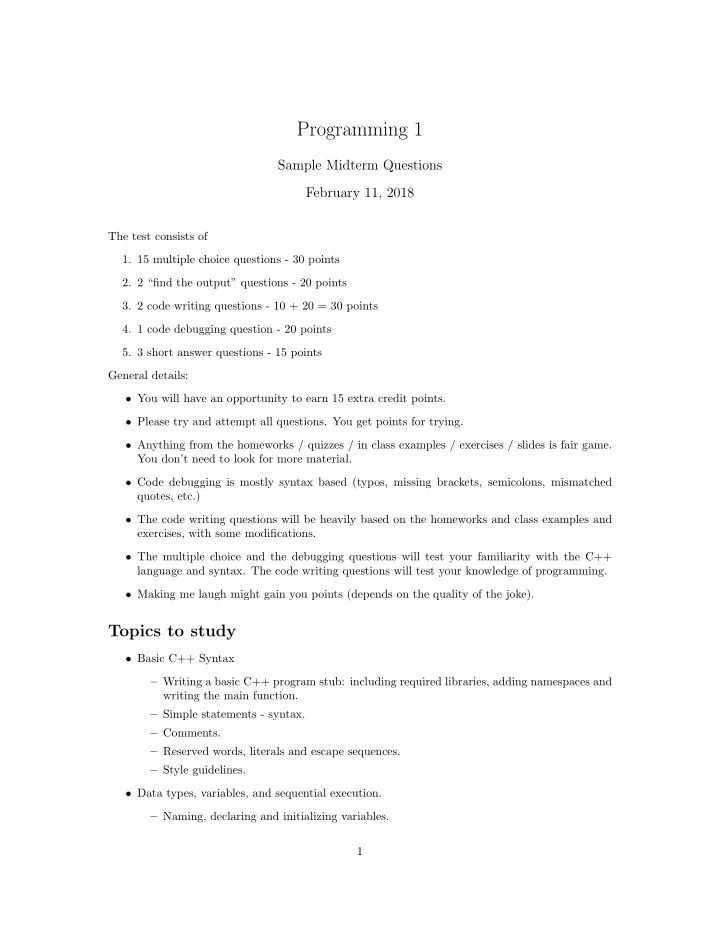

Programming 1 Sample Midterm Questions February 11, 2018 The test consists of 1. 15 multiple choice questions - 30 points 2. 2 “find the output” questions - 20 points 3. 2 code writing questions - 10 + 20 = 30 points 4. 1 code debugging question - 20 points 5. 3 short answer questions - 15 points General details: • You will have an opportunity to earn 15 extra credit points. • Please try and attempt all questions. You get points for trying. • Anything from the homeworks / quizzes / in class examples / exercises / slides is fair game. You don’t need to look for more material. • Code debugging is mostly syntax based (typos, missing brackets, semicolons, mismatched quotes, etc.) • The code writing questions will be heavily based on the homeworks and class examples and exercises, with some modifications. • The multiple choice and the debugging questions will test your familiarity with the C++ language and syntax. The code writing questions will test your knowledge of programming. • Making me laugh might gain you points (depends on the quality of the joke). Topics to study • Basic C++ Syntax – Writing a basic C++ program stub: including required libraries, adding namespaces and writing the main function. – Simple statements - syntax. – Comments. – Reserved words, literals and escape sequences. – Style guidelines. • Data types, variables, and sequential execution. – Naming, declaring and initializing variables. 1
– Primitive data types. – Type Conversions - implicit and explicit. – Arithmetic Operators and operator precedence. • I/O - printing and reading values from the user. – cout statements - printing literals and variables. – Precision for floating point variables. – Using cin to read data of different kinds. • Selection statements and loops – Relational and logical operators. – Writing simple, multiple and nested if statements. – switch - case statements. – while, do-while and for loops – break and continue statements. • Writing functions in C++. – Writing simple functions. – Passing arguments and returning values. Pass by value and pass by reference. – Scope of local and global variables. – Function overloading and default parameters. • Studying the topics listed above will be enough to pass the test. To get a 100, you would be required to study everything on the notes. • You don’t need to study from outside sources. The test is made entirely from the notes, quizzes and assignments. Sample Questions 1. Which of the following is NOT a C++ reserved word? (a) switch (b) continue (c) void (d) main 2. Evaluate the following expression. x = 5, y = 15, z = 3 (All integers) x * 4 + y / 2 % z (a) 21 (b) 2 (c) 2.5 (d) None of the above 2
3. A C++ variable can begin with (a) A letter (b) underscore (c) ‘$’ sign (d) All of the above 4. Write a program to calculate the sum of all the multiples of 3 between 1 and 200. Sample Run: The sum is : 6633 5. Write a C++ program to read in a series of numbers from the user. Stop when the user enters 0. Print the sum of the square roots of the numbers. If the number is negative, consider its absolute value. Sample Run: Enter the numbers: 15 -20 123 -5 0 The sum is 21.6717 6. Write a C++ function that accepts an integer ’N’ as a parameter. In the function, read in ’N’ numbers from the user and print the sum of all the odd numbers Sample Run: Enter 10 numbers: 2 13 -5 9 34 8 10 -11 15 6 The sum of the odd numbers is 21 7. Figure out the output generated by the following code snippet: int score = 83; char grade; if (score >= 90) grade = ’A’; else if (score >= 80) grade = ’B’; else if (score >= 70) grade = ’C’; else if (score >= 60) grade = ’D’; else grade = ’F’; cout<<"Student grade = " <<grade<<endl; 8. What is the difference between pass by value and pass by reference? 3
Recommend
More recommend